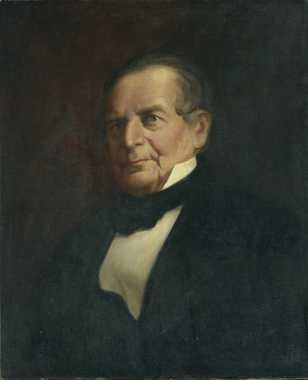Hans Christian Petersen
First Minister 1858 - 1861
Article | Last updated: 01/06/2011

Hans Christian Petersen was lawyer and politician.
(Painting 1918: Thyge Matthiasen, photo: Oslo Museum).
Councillor of State 17 October 1839-8 March 1844, Chief of the Ministry of the Navy. Member of the Council of State Division in Stockholm June 1840, Chief of the Ministry of the Navy June 1841, Member of the Council of State Division in Stockholm September 1843.
Councillor of State 8 March 1844-17 June 1856, Member of the Council of State Division in Stockholm. Chief of the Ministry of the Navy September 1844, Chief of the Ministry of Justice and the Police April 1845, leave of absence January 1846, Chief of the Ministry of Justice and the Police April 1846, Member of the Council of State Division in Stockholm July 1847, Chief of the Ministry of the Interior July 1848, Member of the Council of State Division in Stockholm July 1849, Chief of the Ministry of Justice and the Police September 1850, Chief of the Ministry of the Army September 1851, Member of the Interim Government in Stockholm 15-18 July 1852, Chief of the Ministry of the Army October 1852, Member of the Interim Government in Stockholm 11 October 1852-12 April 1853, Chief of the Ministry of the Navy April 1853, Chief of the Ministry of Justice and the Police June 1853, Member of the Council of State Division in Stockholm September 1853, Chief of the Ministry of Justice and the Police July 1854, Member of the Council of State Division in Stockholm September 1855.
Councillor of State 16 December 1856-17 December 1861, First Minister and Chief of the Ministry of Justice and the Police. Also Chief of the Ministry of the Navy May 1859, Chief of the Ministry of the Navy and Chief of the Ministry of Auditing July 1859, Chief of the Ministry of Auditing July 1860. Resigned 12 December 1861.
Born in Christianssand (Kristiansand) 11 August 1793, son of Chief Medical Officer Claus Peter Petersen (1762-1823) and Christine Wilhelmine Lakier (1768-1817).
Married in Christiania (Oslo) 27 May 1816 to Kristine Marie Thrane (1796-1876), daughter of merchant and Stadthauptmann Paul Thrane (1753-1830) and Judith Abigael Clausen (1775-1833).
Uncle of labour rights pioneer Marcus Thrane.
Deceased in Christiania 26 September 1862. Buried at Vår Frelsers gravlund (Our Saviour Cemetery) in Christiania.
Hans Christian Petersen grew up in Christianssand and graduated from the local cathedral school in 1810. He studied law at the University of Copenhagen and got his law degree there on 14 January 1814 – the day the Kiel Peace Treaty transferred Norway from Danish to Swedish sovereignty. Petersen now wanted to return home to participate in the fight for independence, but the sea route was blocked and on Swedish territory he would be demanded to swear allegiance to the Swedish King. Together with several others – one of them his later wife – he crossed by rowing boat to Sweden, before continuing over land to Christiania disguised as a coachman.
In April 1814 Petersen became acting stipendiary magistrate in Kragerø. He was later in charge of the secretariat of the Naval Conscription Commissariat before becoming clerk of record at Norway’s new Supreme Court in June 1815. In 1817 Petersen received his licence as a barrister, and was able to run a lucrative legal practice for the next twenty years. From 1821 he was defence counsel at the Court of Impeachment, defending i.a. Councillors of State Thomas Fasting (1821) and Jonas Collett (1827) and Prime Minister Severin Løvenskiold (1836).
Petersen was an eloquent lawyer, something that also had to do with his experience as an actor in the Norwegian Dramatic Society until 1827. He spoke Latin fluently. In his 1844 textbook author Henrik Wergeland used excerpts of Petersen’s defence speeches in the Court of Impeachment as examples of an eloquence “bordering on poetry”.
From 1828 Petersen was lawyer for the Bank of Norway department in Christiania, and from 1830-1834 acting Attorney General – an office he left due to disagreement on the salary. He then conducted individual court cases for ministries until 1837. After having defended Prime Minister Løvenskiold during impeachment prosecutions in 1836, he was offered to join the Government, but rejected. In stead he accepted the appointment as diocesan county governor in Christiania.
Two years later Petersen accepted to become councillor of state in the Second Wedel Government (1836-1844), and was appointed chief of the Ministry of the Navy in October 1839. Apart from two periods at the Norwegian Council of State Division in Stockholm, he was chief of the Ministry of the Navy for the rest of this period.
During the Løvenskiold/Vogt Government (1844-1856) Petersen alternated between service at the Council of State Division in Stockholm and the responsibility as chief of the Ministries of the Navy, Justice, the Interior and the Army.
During the Vogt Government (1856-1858) Petersen alternated between the Council of State Division in Stockholm and the Ministries of the Army, the Navy and Justice. In early December 1858 he succeeded Jørgen Vogt as first minister in Christiania.
During the Sibbern/Birch/Motzfeldt Government (1858-1861) Petersen continued as the First Minister in Christiania. He now alternated between the responsibility as chief of the Ministries of Justice, the Navy and Auditing.
Petersen was among those influencing King Oscar I to grant Norway a more equal status in the union with Sweden, but after the accession of King Carl XV in 1859 he found it difficult to cooperate with the monarch. Following the King’s expression of dissatisfaction at Petersen’s role in the debate on a new union commission, Petersen tendered his resignation and left the Government in December 1861.
Petersen was the founder of the juridical quarterly Norsk Retstidende.
Sources:
Norsk Biografisk Leksikon
National Library of Norway